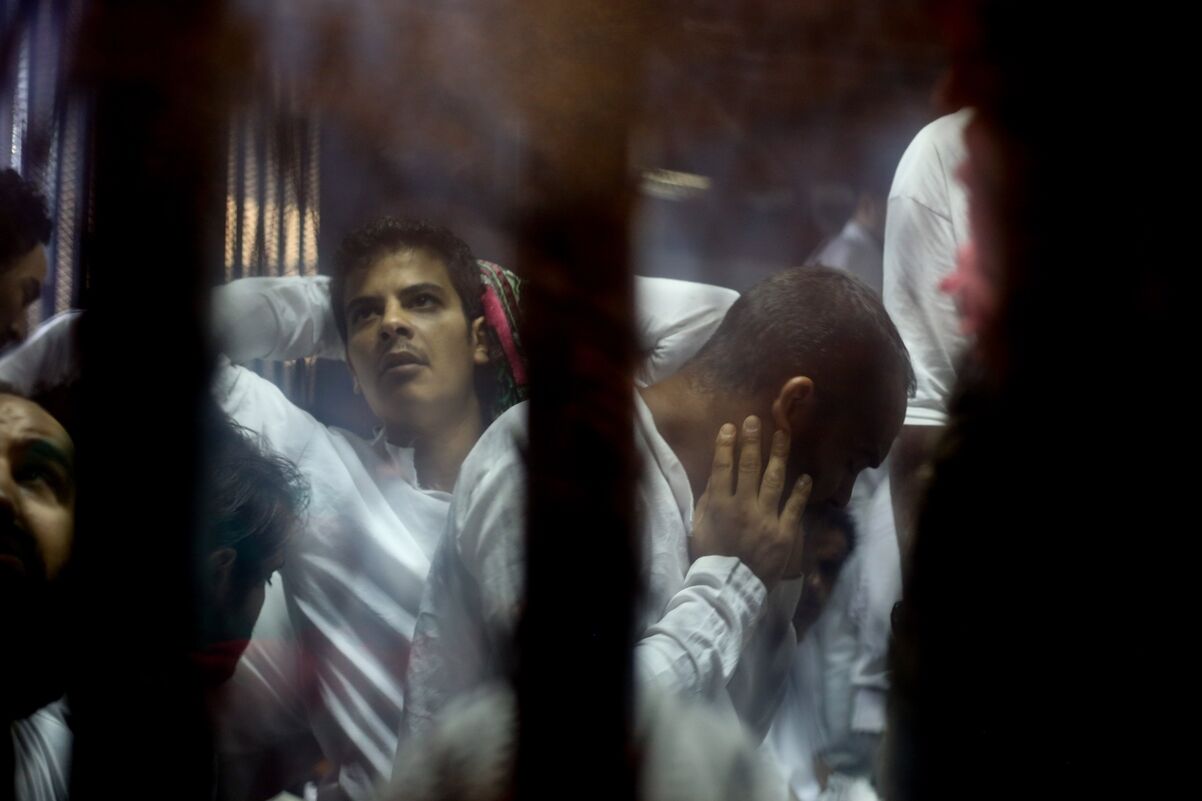Egypt is set to enact one of the world’s most sweeping and extreme pieces of anti-LGBTQ legislation following a harsh crackdown on the local queer community.
On Wednesday, member of parliament Ryad Abdel Sattar introduced a bill that would criminalize homosexuality in the North African nation, where sodomy isn’t prohibited current under law. Being found guilty for engaging in “perverted sexual relations” results in a one- to three-year prison sentence. Any subsequent conviction means five years behind bars.
But the legislation goes much further than that. Similar to Russia’s anti-gay propaganda law, the bill attempts to totally extinguish LGBTQ life in Egypt.
“Individuals that incite same sex relations even if they don’t perform the act itself, will be punished to prison for a period no less than one year and no more than three years, as well as shutting down the venue,” the bill reads, specifically calling out spaces that “host” or “facilitate” LGBTQ events.
Multiple violations of the law, as in the prohibition against sodomy, entail a five-year sentence.
The law also targets any media, whether audio or video, which is viewed as promoting homosexuality. Egypt’s Supreme Council for Media Regulation banned any mention of LGBTQ issues in news, radio, or television broadcasts earlier this month, unless the subject of discussion is repentance for sin. The bill’s ban on media promotion would likely function similarly, blocking any remotely positive mention of queer people.
Anyone found guilty of circulating pro-LGBTQ propaganda will recieve a punishment of up to three years in jail, even if they aren’t queer or transgender.
Lastly, the extremely broad law prohibits Egyptians from carrying “any symbol or sign of the LGBTQ community,” a clear response to the hoisting of a rainbow Pride flag at a Mashrou’ Leila concert last month. The legislation also states that it’s illegal to “produce, sell, market, or promote such products.” Any violation results in a prison sentence of between one and three years.
The law was proposed following a series of arrests in Egypt, as police target LGBTQ people in an unprecedented siege on the local community. More than 70 people have been jailed following the Sept. 22 music festival. Many of those detained were straight, and some remain in prison.
LGBTQ activists tell INTO that the legislation, which is likely to go into effect, will only lead to further attacks on queer people.
“The legislation will pass the parliament by a vast majority,” says Hafez, an Egyptian activist based in the United States, in a phone interview. “I don’t think anyone will vote against it. It’s going to be disastrous. It not only targets LGBTQ people, but it also targets people that are allied to the cause and support us.”
“We will be seeing many, many more arrests than we’ve seen before,” he predicts.
What makes the law so unprecedented, Hafez says, is that the legislation is a “hybrid” of many other anti-LGBTQ bills. It acts an addendum strengthening Egypt’s 1961 law on “debauchery,” a once outdated civil code that has recently been used to target sex work, as well as any public behavior the government doesn’t agree with.
The parallels to Russia’s 2013 law on “homosexual propaganda” offer a chilling warning to the LGBTQ community in Egypt.
That law, which prohibits the spread of information on “nontraditional sexual relationships” to minors, has led to an epidemic of hate crimes in the Eurasian country. Since the legislation was enacted by the Duma four years ago, numerous gay men have been kidnapped, beaten, and tortured. Their attackers frequently broadcast the victims’ humiliation on YouTube to publicly shame them.
Egypt’s law is arguably more broad than the Russian legislation.
The severity with which Egyptian authorities are lashing out at LGBTQ people is no accident, Hafez explains. The country’s military dictatorship once relied on the Muslim Brotherhood as a scapegoat, but after the Sunni Islamist group lost political power, they’re no longer a credible patsy.
“The government needs to keep that flame of hatred directed toward a group,” Hafez says. “The easiest target is the LGBTQ community. They’re weak, not organized, and in hidinga lot of people are not out.”
And the government, he adds, can count on immediate support from the conservative public in cracking down on LGBTQ people.
Queer and trans citizens have reportedly been leaving the country in droves following Egypt’s embrace of fundamentalism. The nation is no longer safe for LGBTQ individuals, Hafez says. Many have been changing their Facebook names and unfriending other members of the community in order to avoid being targeted on social media.
“People are terrified,” Hafez claims. “They’re going underground.”
As the campaign against LGBTQ people escalates, advocates are calling on foreign nations to take action. Although Hafez argues that the proposed anti-gay law is a “clear violation” of the United Nations’ Universal Declaration of Human Rights, few member countries have challenged the crackdown. French President Emmanuel Macron recently claimed that he refused to “lecture” Egypt on LGBTQ rights.
A failure to oppose the proposed law, Hafez claims, will only allow the spread of violent homophobia in the Arab world.
“Egypt is a very influential country in the region,” he says. “Countries that are identical socially but don’t have anti-LGBTQ lawslike Jordan, Iraq, and Libyawill follow in their footsteps. It will give legitimacy to any crackdown in the region.”
“We need to stand together in this,” Hafez adds. “Today it could be Egypt, and tomorrow it could be somewhere else.”
Photography: Mostafa El Shemy/Anadolu Agency/Getty Images
Help make sure LGBTQ+ stories are being told...
We can't rely on mainstream media to tell our stories. That's why we don't lock our articles behind a paywall. Will you support our mission with a contribution today?
Cancel anytime · Proudly LGBTQ+ owned and operated
Read More in Impact
The Latest on INTO
Subscribe to get a twice-weekly dose of queer news, updates, and insights from the INTO team.
in Your Inbox















